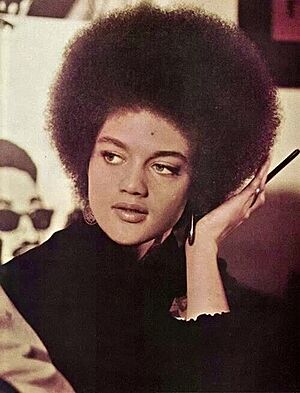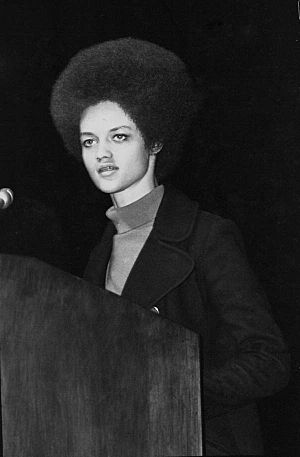Kathleen Cleaver facts for kids
Quick facts for kids
Kathleen Cleaver
|
|
|---|---|

Cleaver in 1968
|
|
| Born |
Kathleen Neal
May 13, 1945 |
| Occupation | Academic |
| Political party | Black Panther Party |
| Movement | Black Power Movement |
| Spouse(s) | |
| Children | 2 |
Kathleen Neal Cleaver (born May 13, 1945) is an American law professor and activist. She is well-known for her important role in the Black Power movement and the Black Panther Party. These groups worked for equal rights and power for Black people in the United States.
Contents
Early Life and Education
Kathleen Neal was born in Dallas, Texas, on May 13, 1945. Her parents were both college graduates and activists. Her father, Ernest Eugene Neal, was a sociology professor. Her mother, Pearl Juette Johnson, had a master's degree in math.
When Kathleen was three, her family moved to Alabama. Her father worked at the Tuskegee Institute. Later, her father joined the United States Foreign Service, which meant working for the U.S. government in other countries. The family lived in places like India, Liberia, Sierra Leone, and the Philippines. Living in India helped Kathleen learn about different ideas, such as how societies could be organized.
After her brother passed away, the family returned to the United States. Kathleen went to George School, a Quaker boarding school that had recently allowed students of all races. She graduated with high honors in 1963. She then attended Oberlin College and later Barnard College.
In 1966, Kathleen left college to work for the New York office of the Student Nonviolent Coordinating Committee (SNCC). This group worked for civil rights. She joined after a friend was killed. At this time, the civil rights movement was changing. It moved from asking for "Freedom Now" to demanding "Black Power."
Joining the Black Panther Party
Kathleen helped organize a student meeting at Fisk University. There, she met Eldridge Cleaver, who was a leader in the Black Panther Party. He was the party's Minister of Information.
In November 1967, Kathleen moved to San Francisco to join the Black Panther Party. She and Eldridge married soon after. She became the Communications Secretary for the party. This was a very important job. She helped organize protests, create flyers, hold press conferences, design posters, and speak at rallies and on TV. She used what she learned from SNCC to help the Black Panther Party.
Kathleen Cleaver was one of the few women who were well-known in the Black Panther Party. Even though many women were members, she was among a small group of female leaders. She was the first woman to be part of the Party's main decision-making group. Her role was like being a spokesperson and press secretary. She also led the effort to free Huey Newton, one of the party's founders, from jail.
The Black Panther Party faced many challenges. Kathleen found it very difficult when many of her fellow members were harmed or lost their lives. In 1968, she ran for a political office in California. She was a candidate for the Peace and Freedom party.
Because of their work with the Black Panther Party, Kathleen and Eldridge Cleaver were often watched by the police. Their home was searched in 1968. Later, Eldridge Cleaver faced legal issues. He left the country and lived in Cuba and then Algeria for a time.
During her time with the Black Panther Party, Kathleen helped many people. She helped provide food and medical care to families. She also helped families visit loved ones in prison. She later helped create special gatherings for women who had been part of the Black Panther Party. These gatherings helped them heal from their difficult experiences.
Life in Other Countries
In 1969, Kathleen joined Eldridge in Algeria. Their first son, Maceo, was born there. A year later, in 1970, their daughter Joju Younghi was born while the family was in North Korea.
Eldridge Cleaver and Huey Newton had different ideas about how the Black Panther Party should move forward. Newton wanted to focus on community programs, like providing food and health care. Cleaver wanted a more direct approach to change. Because of these differences, the Cleavers formed a new group in 1971.
Kathleen returned to New York with her children to promote this new organization. The Algerian government became unhappy with Eldridge, so he had to leave the country secretly. He met Kathleen in Paris in 1973. Kathleen returned to the United States later that year to help arrange Eldridge's return and raise money for his legal defense.
In 1974, the French government allowed the Cleavers to live in France, and the family was together again. However, after only a year, they moved back to the United States. Eldridge was arrested and faced legal charges from the 1968 events. He was found responsible for assault and given community service. Kathleen worked hard to raise money for his defense, and he was released on bail in 1976. Eldridge's legal situation was finally resolved in 1980. During this time, Eldridge's political views changed.
Later Life and Career
Kathleen Cleaver left Eldridge in 1981. She went back to college at Yale University with a full scholarship. She graduated in 1984 with a degree in history, earning top honors. In 1987, she and Eldridge Cleaver divorced.
Kathleen decided she wanted to become a lawyer after watching the Watergate Hearings in the early 1970s. She continued her education at Yale Law School and earned her law degree in 1989.
After law school, she worked for a law firm. She also held many other jobs, including working for a judge and teaching at several universities. These included Emory University, Benjamin N. Cardozo School of Law, Yale University, and Sarah Lawrence College.
In 2005, Cleaver received a special fellowship from the Fletcher Foundation. She has worked as a Senior Research Associate at Yale Law School and a Senior Lecturer in African American Studies at Yale University. Today, she is a senior lecturer at Emory University School of Law.
Besides her teaching career, Kathleen Cleaver works on many campaigns. These include efforts to free Mumia Abu-Jamal and Geronimo Pratt. She has also worked for many years on a book about her life called Memories of Love and War. Her writings have appeared in many newspapers and magazines. She has also contributed essays to several books about race and activism. She helped edit some of Eldridge Cleaver's writings as well.
See also
 In Spanish: Kathleen Neal Cleaver para niños
In Spanish: Kathleen Neal Cleaver para niños
- The Black Panthers: Vanguard of the Revolution
Images for kids
 | Victor J. Glover |
 | Yvonne Cagle |
 | Jeanette Epps |
 | Bernard A. Harris Jr. |




